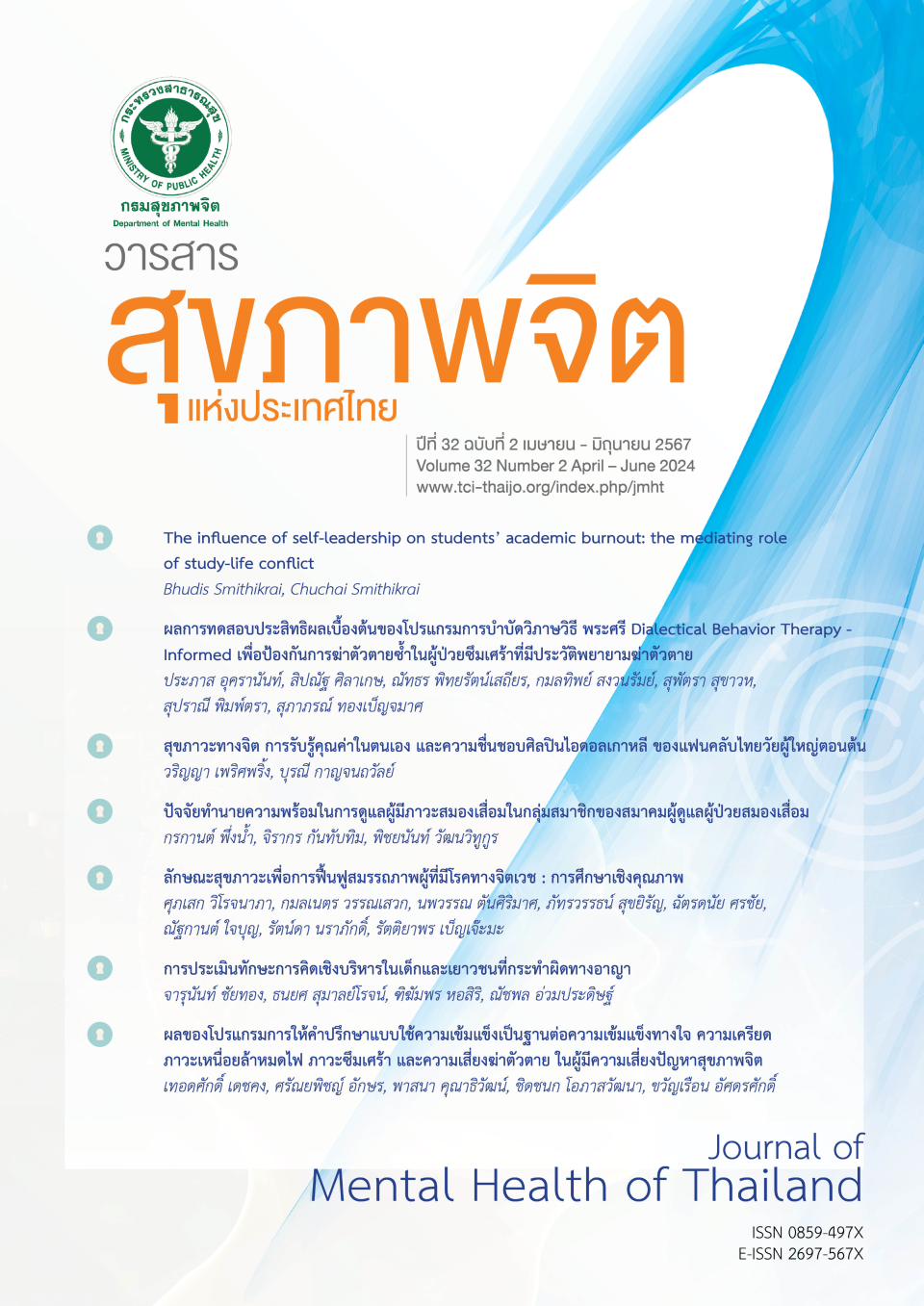อิทธิพลของภาวะผู้นำตนเองที่มีต่อภาวะหมดไฟในการเรียนของนักศึกษา : บทบาทการเป็นตัวแปรสื่อของความขัดแย้งระหว่างการเรียนกับชีวิต
คำสำคัญ:
ความขัดแย้งระหว่างการเรียนกับชีวิต, ภาวะผู้นำตนเอง, ภาวะหมดไฟในการเรียน, นักศึกษามหาวิทยาลัยบทคัดย่อ
วัตถุประสงค์ : เพื่อศึกษาความสัมพันธ์ระหว่างภาวะผู้นำตนเอง ความขัดแย้งระหว่างการเรียนกับชีวิต และภาวะหมดไฟในการเรียนของนักศึกษามหาวิทยาลัย
วิธีการ : การศึกษาภาคตัดขวางแบบออนไลน์ ในนักศึกษาระดับปริญญาตรีในประเทศไทยจากการสุ่มตัวอย่างตามสะดวก เครื่องมือประกอบด้วย แบบวัดภาวะหมดไฟสำหรับนักศึกษา แบบวัดภาวะผู้นำตนเองแบบย่อ แบบวัดความขัดแย้งระหว่างการเรียนกับชีวิต และแบบสอบถามข้อมูลส่วนบุคคล วิเคราะห์ข้อมูลการใช้สถิติเชิงพรรณนาเพื่อบรรยายข้อมูลพื้นฐาน ทดสอบการสื่ออิทธิพลของตัวแปรโดยการใช้โปรแกรมทางสถิติ (PROCESS, Model 4)
ผล : กลุ่มตัวอย่างที่ตอบแบบสอบถามครบถ้วน 601 คน เป็นหญิงร้อยละ 62.9 อายุเฉลี่ย 20.17 ปี ภาวะผู้นำตนเองมีความสัมพันธ์เชิงลบกับภาวะหมดไฟในการเรียน โดยมีอิทธิพลทั้งทางตรง (β = -.25, p < .01) และทางอ้อมผ่านความขัดแย้งระหว่างชีวิตกับการเรียน (β = -.05, p < .01) และพบว่าความขัดแย้งระหว่างชีวิตกับการเรียนมีบทบาทเป็นตัวแปรสื่อในความสัมพันธ์ระหว่างภาวะผู้นำตนเองกับภาวะหมดไฟในการเรียน
สรุป : ภาวะผู้นำตนเองสามารถบรรเทาภาวะหมดไฟในการเรียนของนักศึกษามหาวิทยาลัยได้ทั้งทางตรงและทางอ้อมผ่านการลดความขัดแย้งระหว่างการเรียนกับชีวิต
Downloads
เอกสารอ้างอิง
Barker ET, Howard AL, Villemaire-Krajden R, Galambos NL. The rise and fall of depressive symptoms and academic stress in two samples of university students. J Youth Adolesc. 2018;47(6):1252-66. doi:10.1007/s10964-018-0822-9.
Liu Z, Xie Y, Sun Z, Liu D, Yin H, Shi L. Factors associated with academic burnout and its prevalence among university students: a cross-sectional study. BMC Med Educ. 2023;23(1):317. doi:10.1186/s12909-023-04316-y.
Jagodics B, Szabó É. Student burnout in higher education: a demand-resource model approach. Trends in Psychology. 2022;31(4):757-76. doi:10.1007/s43076-021-00137-4.
Chae H, Cloninger CR, Lee SJ. Effects of personality on the developmental trajectories of academic burnout among Korean medical students. PeerJ. 2020;8:e10362. doi:10.7717/peerj.10362.
Yaghoobi A, Mokhtaran M, Mohammadzadeh S. Cognitive styles and psychological resilience as predictors of academic burnout. Iranian Evolutionary Educational Psychology Journal. 2019;1(1)1-7. doi:10.29252/IEEPJ.1.1.1.
Usán Supervía P, Salavera Bordás C. Burnout, goal orientation and academic performance in adolescent students. Int J Environ Res Public Health. 2020;17(18):6507. doi:10.3390/ijerph17186507.
Lin F, Yang K. The external and internal factors of academic burnout. Advances in Social Science, Education and Humanities Research. 2021;615:1815-21. doi:10.2991/assehr.k.211220.307.
Luo Y, Zhang H, Chen G. The impact of family environment on academic burnout of middle school students: The moderating role of self-control. Child Youth Serv Rev. 2020;119(Suppl 1):105482. doi:10.1016/j.childyouth.2020.105482.
Kaggwa MM, Kajjimu J, Sserunkuma J, Najjuka SM, Atim LM, Olum R, et al. Prevalence of burnout among university students in low- and middle-income countries: a systematic review and meta-analysis. PLoS One. 2021;16(8):e0256402. doi:10.1371/journal.pone.0256402.
Department of Mental Health. Mental health survey revealed a significant prevalence of burnout symptoms among children engaging in online learning [Internet]. Nonthaburi: Department of Mental Health; 2021 [cited 2024 Jan 8]. Available from: https://dmh.go.th/news-dmh/view.asp?id=31151
Chulalongkorn University Social Research Institute. The study of mental behavior of university students [Internet]. Bangkok: Chulalongkorn University Social Research Institute; 2023 [cited 2024 Jan 8]. Available from: http://www.cusri.chula.ac.th/wp-content/uploads/2023/05/Final_Executive_A5_compressed.pdf
Neck CP, Manz CC, Houghton JD. Self-leadership: The Definitive Guide to Personal Excellence. Thousand Oaks, CA: SAGE Publications, Inc.; 2020.
Neuhaus M, Houghton J. Self-leadership. In Goethals GR, Allison ST, Sorenson GJ, editors. The SAGE encyclopedia of leadership studies. California: SAGE Publications, Inc.; 2023 [cited 2024 Jan 3]. Available from: https://doi.org/10.4135/9781071840801
Bakker AB, Demerouti E. Job demands–resources theory: taking stock and looking forward. J Occup Health Psychol. 2017;22(3):273-85. doi:10.1037/ocp0000056.
Harari MB, Williams EA, Castro SL, Brant KK. Self‐leadership: a meta‐analysis of over two decades of research. J Occup Organ Psychol. 2021;94(4):890–923. doi:10.1111/joop.12365.
Junça Silva A, Almeida A, Rebelo C. The effect of telework on emotional exhaustion and task performance via work overload: the moderating role of self-leadership. Int J Manpow. 2024:45(2);398-421. doi:10.1108/ijm-08-2022-0352.
Maykrantz SA, Houghton JD. Self-leadership and stress among college students: examining the moderating role of coping skills†. J Am Coll Health. 2018;68(1):89-96. doi:10.1080/07448481.2018.1515759.
Lapian LG, Zulkifli A, Razak A, Sidin I. A quasi-experimental study: can self-leadership training and emotional intelligence mentoring lower burnout rates in hospital nurses? Open Access Maced J Med Sci. 2022;10(E):905-12. doi:10.3889/oamjms.2022.8756.
Sjöblom K, Juutinen S, Mäkikangas A. The importance of self-leadership strategies and psychological safety for well-being in the context of enforced remote work. Challenges. 2022;13(1):14. doi:10.3390/challe13010014.
Grobelna A. A study–life conflict and its impact on tourism and hospitality students’ burnout and their employment aspirations. Sustainability. 2022;14(11):6608. doi:10.3390/su14116608.
Badri SKZ. Study-life integration and young adult students mental health. J Public Ment Health. 2020;20(1):24-32. doi:10.1108/jpmh-06-2019-0069.
Houghton JD, Wu J, Godwin JL, Neck CP, Manz CC. Effective stress management: a model of emotional intelligence, self-leadership, and student stress coping. Qual Rep. 2011;36(2):220-38. doi:10.1177/1052562911430205.
Sternthal B, Richard P, Calder BJ, Tubott AM, Richard P. Experimental design: generalization and theoretical explanation. In Bagozzi RP, editor. Principles of marketing research. Cambridge, MA: Blackwell Business; 1994.
Faul F, Erdfelder E, Lang AG, Buchner A. G*Power 3: a flexible statistical power analysis program for the social, behavioral, and biomedical sciences. Behav Res Methods. 2007;39(2):175-91. doi:10.3758/bf03193146.
Maslach C, Jackson SE, Leiter MP, Schaufeli WB. MBI - general survey for students - MBI-GS (S) [Internet]. Menlo Park: Mind Garden, Inc.; 2016 [cited 2024 Jan 8]. Available from: https://www.mindgarden.com/313-mbi-general-survey-for-students
Houghton JD, Dawley D, DiLiello, TC. The abbreviated self-leadership questionnaire (ASLQ): a more concise measure of self-leadership. International Journal of Leadership Studies. 2012;7(2):216-32.
Ringle CM, Wende S, Becker J. SmartPLS 4 [Internet]. Monheim am Rhein: SmartPLS; 2022 [cited 2022 Nov 7]. Available from: https://www.smartpls.com
Hair JF, Hult GT, Ringle CM, Sarstedt M. A primer on partial least squares structural equation modeling (PLS-SEM). 2nd ed. Thousand Oaks, CA: Publications, Inc.; 2017.
Fornell C, Larcker DF. Evaluating structural equation models with unobservable variables and measurement error. J Mark Res. 1981;18(1):39. doi:10.2307/3151312.
Hayes AF, Little TD, Hayes AF. Introduction to mediation, moderation, and conditional process analysis: a regression-based approach. New York: The Guilford Press; 2022.
Maykrantz SA, Houghton JD. Self-leadership and stress among college students: Examining the moderating role of coping skills†. J Am Coll Health. 2020;68(1):89-96. doi:10.1080/07448481.2018.1515759.
Kutsyuruba B, Godden L. The role of mentoring and coaching as a means of supporting the well-being of educators and students. International Journal of Mentoring and Coaching in Education. 2019;8(4):229-34. doi:10.1108/ijmce-12-2019-081.
ดาวน์โหลด
เผยแพร่แล้ว
รูปแบบการอ้างอิง
ฉบับ
ประเภทบทความ
สัญญาอนุญาต
ลิขสิทธิ์ (c) 2024 วารสารสุขภาพจิตแห่งประเทศไทย

อนุญาตภายใต้เงื่อนไข Creative Commons Attribution-NonCommercial-NoDerivatives 4.0 International License.
- ผู้อ่านสามารถนำข้อความ ข้อมูล จากวารสารไปใช้ไปใช้ประโยชน์ทางวิชาการได้ เช่น เพื่อการสอน เพื่อการอ้างอิง แต่การนำไปใช้เพื่อวัตถุประสงค์อื่น เช่น เพื่อการค้า จะต้องได้รับอนุญาตเป็นลายลักษณ์อักษรจากกรมสุขภาพจิตก่อน
- ความคิดเห็น ข้อมูล และบทสรุปต่าง ๆ ที่ลงตีพิมพ์ในวารสารสุขภาพจิตแห่งประเทศไทยเป็นของผู้เขียนบทความและมิได้แสดงว่ากองบรรณาธิการหรือกรมสุขภาพจิตเห็นพ้องด้วย




